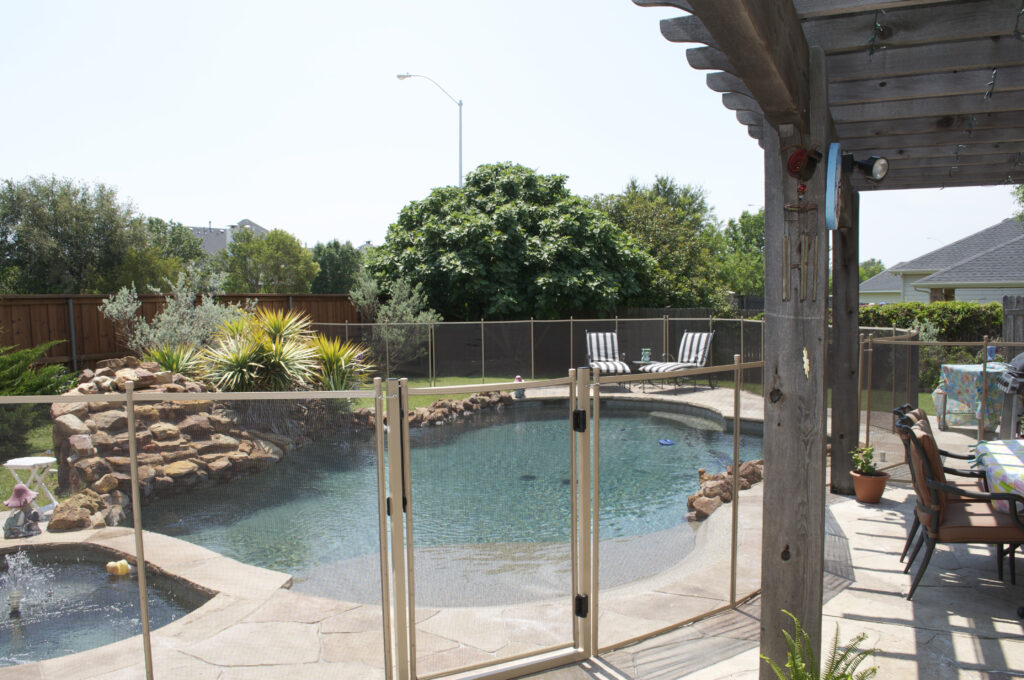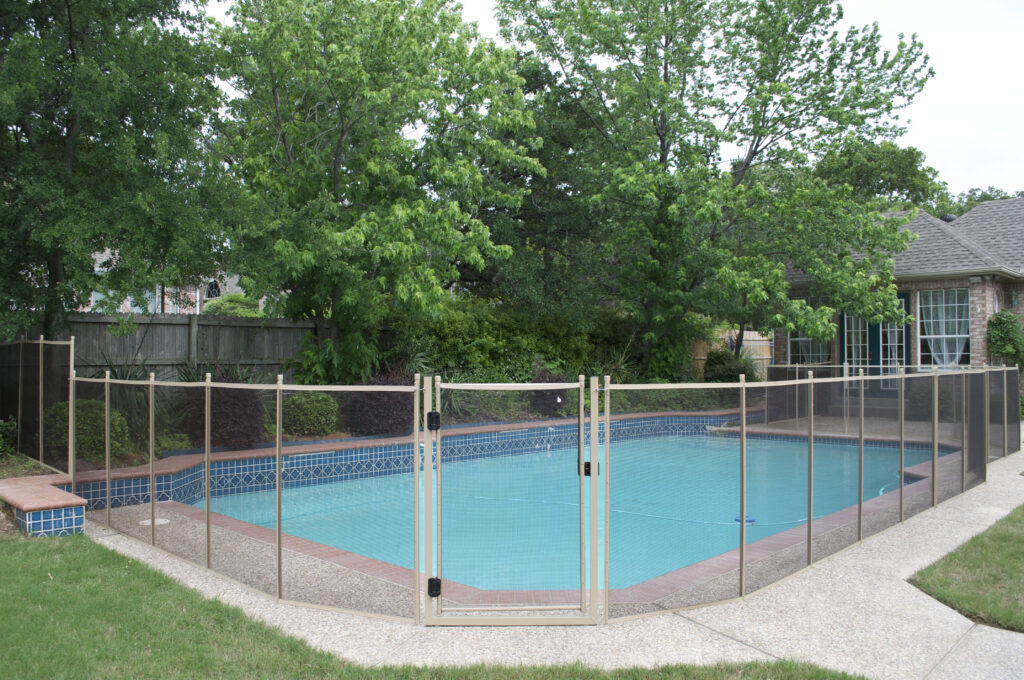Installing a pool in your North Carolina backyard? You’ll need more than a shovel and a dream, you’ll need a fence that meets the NC pool fence code. North Carolina takes pool safety seriously, and if your fence doesn’t meet code, you could face fines, failed inspections, or insurance complications.
The good news? Getting it right doesn’t have to be hard. This page gives you everything you need to know about North Carolina pool fence code, clear rules, real requirements, and trusted solutions that help you pass inspection with confidence.
Before we get into the details, let’s find out if your current or planned pool fence passes the test.
Will your current or planned fence pass North Carolina inspection?
Want to be 100% sure? Schedule a free pool fence compliance inspection with Pool Guard™.
Call us today or request a quote online.
The pool fence requirements in NC are laid out in the North Carolina Residential Code, Appendix V. This section is adapted from the International Residential Code and applies statewide. The North Carolina pool fence code was adopted to reduce accidental drownings, which are a leading cause of death for children under five.
If your in-ground pool can hold 24 inches or more of water, it’s legally required to have a compliant barrier. That includes most residential backyard pools. The goal? To prevent accidental access by children, pets, or uninvited guests, and ultimately, to save lives.
These rules apply whether you’re in Raleigh, Charlotte, Greensboro, or a smaller town in between. While counties can add stricter requirements, the baseline code is consistent statewide.
To pass inspection and protect your investment, your fence must meet very specific dimensions and design standards under the NC pool fence code. Here’s what those look like:
To meet North Carolina pool fence code for in-ground pools, your fence must be a minimum of 48 inches tall. That measurement isn’t just for appearances, it’s a legal safety standard designed to protect children and prevent unauthorized access.
Importantly, the 48-inch height is measured from the finished ground level on the outside of the fence, not from decking, mulch, or elevated surfaces inside the yard. This means the full barrier must be consistently tall all the way around, not just at its highest point.
If part of your fence sits on sloped terrain or decorative landscaping, make sure no area falls below the 48-inch requirement when measured from the ground directly outside the barrier.

Fence spacing matters just as much as fence height. Small children can slip through or climb over gaps if the design isn’t properly aligned with the NC pool fence requirements.
Here’s what North Carolina code says:
These spacing rules are designed to eliminate any potential climbing opportunities or entry points for small children.
Gates are one of the most important parts of your fence, and often the reason inspections fail. The North Carolina pool fence code has very specific requirements for how pool gates must function and be installed.
Here’s what’s required for compliance:
The base of your pool fence also plays a key role in safety, and the North Carolina pool fence code sets clear limits here too.
The space between the bottom of the fence and the ground must be 2 inches or less. This helps prevent pets, toddlers, or curious kids from crawling underneath the barrier.
The entire fence structure must be considered non-climbable. That means no footholds or ledges that could be used to scale the fence, no protrusions or decorative elements that stick out more than 1.5 inches horizontally, no nearby objects, like landscaping rocks, planter boxes, furniture, or AC units that someone could use as a climbing surface.
Code inspectors are trained to assess the entire environment surrounding your fence, not just the fence itself. Even if your fence passes the height and spacing checks, a nearby object that creates a climbable situation could lead to a failed inspection.
The goal is to create a secure perimeter that actively prevents children or unauthorized individuals from getting near your pool without adult supervision.
Understanding when a permit is required, what inspectors look for, and what happens if your fence doesn’t comply is essential to getting your pool approved and ready for use.
In most counties across North Carolina, a building permit is required before any in-ground pool construction begins. That includes not only the pool itself but also the permanent fence or barrier system that surrounds it.
Here’s what you’ll typically need:
Most local building departments include fencing in the initial permit application for the pool. However, if you install or modify the fence separately, you may need a standalone permit depending on your municipality.
Before you can fill your pool, or legally use it, you’ll need to pass a final inspection. This ensures your entire pool area, including the fence, complies with the NC pool fence code.
Here’s how the inspection process usually works. First you’ll need to schedule the final inspection once the fence is fully installed and the pool is near completion.
A local building inspector will visit your property to review every detail of the installation. One of the first things they’ll check is the overall height of the fence. Most cities in Ohio require pool barriers to be between 48 and 60 inches tall, depending on the specific local ordinance. Anything shorter will likely be flagged for correction.
Next, the inspector will carefully evaluate the gate. This is one of the most scrutinized parts of a pool barrier system because it’s also the most vulnerable point of entry. The gate must swing outward, away from the pool, and it must close and latch automatically without needing a person to shut it manually. To prevent small children from reaching it, the latch must be mounted at least 54 inches from the ground.
They’ll also look at the spacing between the vertical pickets, panels, and the ground.
If your fence fails inspection, don’t panic—but don’t ignore it either. Sometimes the issue may be minor, like a latch placed a few inches too low. Other times, it may require more serious adjustments, such as raising the entire fence or replacing a climbable design.Failing to comply with the North Carolina pool fence code can result in:
You’ll typically receive a written correction notice outlining exactly what needs to be fixed. Once the updates are made, you can schedule a re-inspection—but this can take time and may come with an additional fee.

Yes. If your in-ground pool holds 24 inches or more of water, a fence is mandatory under the NC residential building code.
Only if it meets the code. It must be:
Often, yes. In many counties, the fence is part of the pool permit process and must be shown in the initial site plan. Some counties may even require a separate fence permit if it extends beyond the pool area.
If you’re installing an in-ground pool in North Carolina, a code-compliant fence is non-negotiable. The NC pool fence code ensures safety, avoids costly fines, and helps you pass inspections. Getting compliant doesn’t have to be complicated. At Pool Guard, we make it easy to meet pool fence requirements in NC, and pass inspections on the first try.
Pool Guard USA is a US-based pool safety equipment manufacturer specializing in pool fences, pool covers, pool safety nets along with installation services throughout the United States.
Please fill out the form below with your information. Your local dealer will be notified about your inquiry.
Please fill out the form below with your information. Your local dealer will be notified about your inquiry.